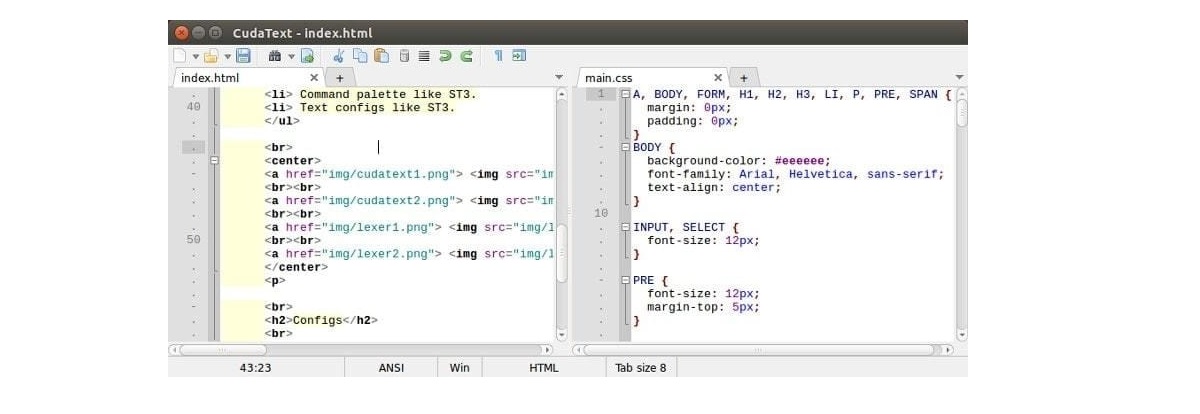
The release of the new version of CudaText 1.161 was announced, a cross-platform open source editor, written with Free Pascal and Lazarus.
The editor supports Python extensions and has a number of advantages over Sublime Text, in addition to having some integrated development environment features implemented as plugins.
Main new features of CudaText 1.161.0
In the year since the previous announcement, commands have been implemented that duplicate the functionality of Sublime Text: "Paste and indent", "Paste from history", as well as improvements to "carets extend" commands, which now correctly multiply carets when traversing short lines.
In the drag and drop text blocks function, a more correct cursor is displayed, can be dragged from read-only documents, plus by analogy with Sublime Text, Ctrl + "press the third mouse button" and Ctrl + "scroll with the mouse wheel" processing is performed.
In the project manager, "embedded sessions" have been added, that is, sessions that are saved directly to the project file and are visible only from within the project. In addition to that in the project manager, a plugin is presented for the items added to the context menu: “Open in default application”, “Focus in file manager”. Also, the “Go to file” command has been sped up.
Has been added a pointer to the "Replace" dialog which allows disabling RegEx substitutions when replacing and optimized large line editing in "wrapped" line mode, edits are much faster for a 40 million character string.
Added option "fold_icon_min_range", which eliminates folding of blocks that are too small, the image viewer supports more formats: WEBP, TGA, PSD, CUR, plus the Undo logic for some editing cases has been made more similar to Sublime Text and Unicode whitespace is now displayed in hexadecimal.
Furthermore, the editor saves the session file every 30 seconds (the interval is set by an option), added support for Extra1/Extra2 mouse buttons to assign commands to them, and added the "-c" command line parameter », which allows you to run any command plugin at program startup.
As for Lexers, the code tree has been improved for the CSS lexer, now correctly display tree nodes even in minified (compressed) CSS documents, while in Lexer Markdown, support for "fenced" blocks when enclosing fragments with other lexers in the document has been added, and the "ini files" lexer has been replaced by a "lightweight" lexer to support large files.
How to install CudaText on Ubuntu and derivatives?
Finally, for those who are interested in being able to install this code editor on their system, they can do it in two different ways.
The first one is simply downloading the application's deb package and performing the installation of this with your favorite package manager or from the terminal.
The second method is downloaded the binary package from the editor, which from a personal point of view is more complete and it is not because there is a difference from the editor of the binary format to the precompiled one for Ubuntu or derivatives.
If not, additionally with the binary some files are included, which are tutorials to learn how to use the editor.
Moving on to the first method, what we are going to do is head to the following link where we can get the deb package.
Once the download is done, we can carry out the installation with a package manager or from the terminal by positioning ourselves in the folder where the download was made and typing the following command:
sudo apt install ./cudatext*.deb
While for the binary simply let's download the package "CudaText linux x64 qt5" or "CudaText linux x64" which the latter is in gtk.
To unzip the file we must do it with the command:
tar -Jxvf archivo.tar.xz
And inside the folder is the binary which we can execute by double clicking on it.
To download the package for another operating system, you can do it from the link below.